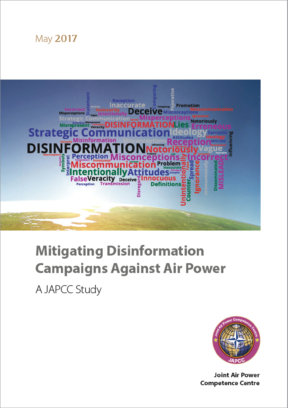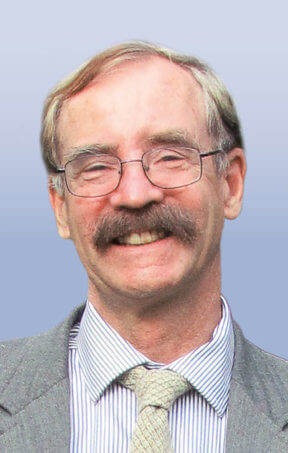Executive Summary
In military operations over the last twenty years, air power has repeatedly proven to be NATO’s great asymmetric advantage. Air power’s ability to accurately strike targets, support troops on the ground, provide accurate and timely intelligence, and transport troops, equipment and supplies over vast distances give NATO an incomparable advantage against its enemies. Moreover, in a crisis, it is air power that is the first responder due to its ability to react quickly and with precision. Yet, it is air power’s very success that makes it the main target for information warfare waged against NATO. In this information battle waged by NATO’s opponents, disinformation is a primary weapon and air power is a primary target.
Information warfare is a method by which NATO’s opponents seek to influence public opinion against NATO and to force NATO to limit or renounce the use of air power in campaigns against both state and non-state actors. If NATO’s enemies can accomplish through a propaganda war what they cannot win on the battlefield, their strategic aim is still achieved – NATO’s major advantage is nullified. The loss of the full use of NATO’s air power advantage would be a serious blow to NATO’s ability to respond effectively to threats.
This Study documents the use of disinformation and misinformation and their role as major weapons in the information war against NATO and Western nations. The Study authors seek to identify and understand this major threat to NATO and to examine how the public opinion of NATO and allied nations can be affected through deliberate disinformation campaigns by adversaries. If NATO can understand the threat of disinformation and can anticipate future disinformation campaigns, it can develop the appropriate doctrine and resources to counter the threat. One broad lesson that can be taken from recent conflicts is that strategic communications plays a critical role in meeting strategic objectives. The JAPCC team that wrote this Study firmly believes that the threat posed by enemy disinformation operations can be answered and overcome through the right strategic communications organization, doctrine and resources.
The Concept of the Study on Air Power and Disinformation
This Study on Air power and Disinformation was commissioned by the Joint Air Power Competence Centre (JAPCC) in Kalkar, Germany with the following objectives:
- To identify how air power in the strike role, and Remotely Piloted Aircraft (RPA) in particular, are understood in the Western nations and the best way to educate audiences about the realities of air power as a continuing effort.
- To understand the nature of disinformation campaigns and misinformation about air operations and how these factors affect NATO’s use of air power.
- To understand the ethics of airstrikes as a legitimate subject of public debate and how willing (and successful) nations have been to engage and educate their publics both outside and during operations.
- To understand the strengths and weaknesses of NATO Strategic Communication and information strategies in specific relation to air power, including weaponized RPA.
- To identify and recommend systems and processes to allow rapid rebuttal and damage assessments that can be put into the unclassified arena to support information campaigns.
- To understand how air power and RPA are portrayed in the public views in selected countries in order to better understand the dynamics of public perceptions of air power in those nations and, thus, across the Alliance.
- To provide specific recommendations as to the likely vulnerabilities of air power to disinformation in future operations and develop doctrinal and policy recommendations to best counter the expected enemy information campaigns and media characterizations of air power.
- To provide specific recommendations on developing StratCom and information strategies with regard to the application of air power.
As part of the Study, the team of academics (6 PhDs) and researchers compiled a data base of more than 2,000 media stories concerning air power and NATO in operations over the last two decades. This data base will enable further study and provides core documentation for NATO training courses to be developed.
Air Campaigns and Strategic Communications Issues
To establish a context for this study, the team of scholars looked at the development of Western air power over the last two decades in terms of Strategic Communication and developed historical data to identify the main disinformation themes employed by NATO’s adversaries. The study establishes that there are two major themes in anti-NATO and anti-air power propaganda: first, that air power is used indiscriminately to target civilians and, even if carefully used, still causes inordinate civilian collateral damage; second, that certain aircraft and weapons and tactics are inherently illegal. This approach, commonly called ‘lawfare’, aims to see the use of RPA in the strike role as well as various munitions outlawed for their indiscriminate nature and for causing civilian casualties. The lawfare movement looks to supersede traditional international law to insist any civilian casualties caused by air attack be considered a war crime.
Playing on these themes, NATO adversaries have found many allies and supporters among Western groups ranging from political movements to Non-Governmental Organizations (NGOs) and to members of academia and the media. Active disinformation campaigns conducted by Middle Eastern groups and the Russian state relentlessly push themes designed to undermine the credibility of air power before the Western public. The anti-air power themes, which include exaggerations of civilian casualties, false claims, and disinformation about NATO tactics and operations, find a ready audience among certain sectors of the NATO public. These disinformation themes also work to incite anti-NATO feeling in the Middle East and developing nations and serve to spur recruitment for radical movements.
The study takes a historical approach, looking at how disinformation against Western air power has been applied over the last 25 years. The effectiveness of disinformation in the past has depended upon several key factors: the effectiveness of NATO’s adversaries in mounting an information campaign, the view of the military held by the public, the media’s presentation of air power to the public, and the ability of NATO and member nations to conduct their own information operations. A study of recent conflicts provides examples of highly effective disinformation campaigns by adversaries and of effective refutation of disinformation by NATO and Western nations. The study made a special examination of Russian information operations, as Russia places great emphasis on and expends considerable resources to wage information campaigns on several fronts.
Strategic Communication, Air power and Major NATO Nations
In order to understand the dynamics of air power and public opinion and to determine the vulnerability of Western nations to disinformation, the study included country studies of five major NATO members (The United States, Great Britain, Germany, France, and Italy), all of which are nations that have participated in NATO operations and operate RPA. The study found unique dynamics influencing public opinion in each country. The country studies highlight some of the key advantages and disadvantages that NATO has in communicating with the public. A central finding in the country studies is that the media in major NATO nations does a mediocre job at covering air power and consequently the public in NATO nations lack good information on air power. Another aspect of the problem is that, in many cases, NATO and member states have not been effective at Strategic Communications, especially on air power issues. Consequently, there is a significant lack of understanding on key issues such as the employment of RPA, which are seen in a highly negative light in a great part of European and American media coverage.
Looking to the Future – Anticipating Future Disinformation Campaigns
NATO’s recent non-state adversaries, such as the Taliban, ISIS and other radical movements, have developed their disinformation and information themes along some very predictable lines. Because of this, we can be fairly sure of how NATO’s enemies will portray NATO air operations and can develop the right kind of Strategic Communications strategy to counter this.
As air power is a primary means and enabler of NATO’s military operations, it will remain a primary target of disinformation campaigns. Enemies will claim status as victims and can be expected to use civilians as human shields to maximize civilian casualties and collateral damage. Civilian suffering, genuine or falsified will be used to gain sympathy and portray NATO air forces in a negative light. At every opportunity, NATO will be portrayed as the aggressor and accused of conducting warfare in an illegal manner. These themes will resonate with a relatively small fraction of the Western public but will find ready acceptance in less developed nations. Despite the lack of a short-term impact, these themes, if not effectively challenged, will have negative effects with the general public in Western nations over time.
Recommendations for Action
The study authors recommend that NATO place greater resources into Strategic Communication. At the strategic level, an essential requirement is for NATO and member forces participating in operations have simple, clear and unified Strategic Communications themes to present to the public. The need for both NATO and major member states to rethink their Strategic Communications organization is clear. The United States, in particular, needs to think of reviving the US Information Agency to lead the StratCom effort. An effective Strategic Communications campaign requires top level command involvement.
At the operational level NATO StratCom doctrine needs to focus on a more proactive approach, emphasizing human rights in its information operations. NATO must focus on its positive human rights record. Likewise, NATO’s opponents have horrible human rights records and specialist legal and media teams need to be organized and assigned to document and publicize the human rights violations of opposing forces. Special teams need to document enemy disinformation campaigns. The Study recommends better approaches to releasing graphics and imagery to pre-empt the expected enemy narrative. Lastly, better Battle Damage Assessment (BDA) is needed to refute the enemy disinformation.
At the practical level measures should be taken to better educate the public about air power and the realities of modern air power in warfare. The first step is to set up short orientation courses for the media to provide journalist with the basic context of air power. To deal with the negative public view of RPA, NATO needs to develop its own documentary films for the public.












